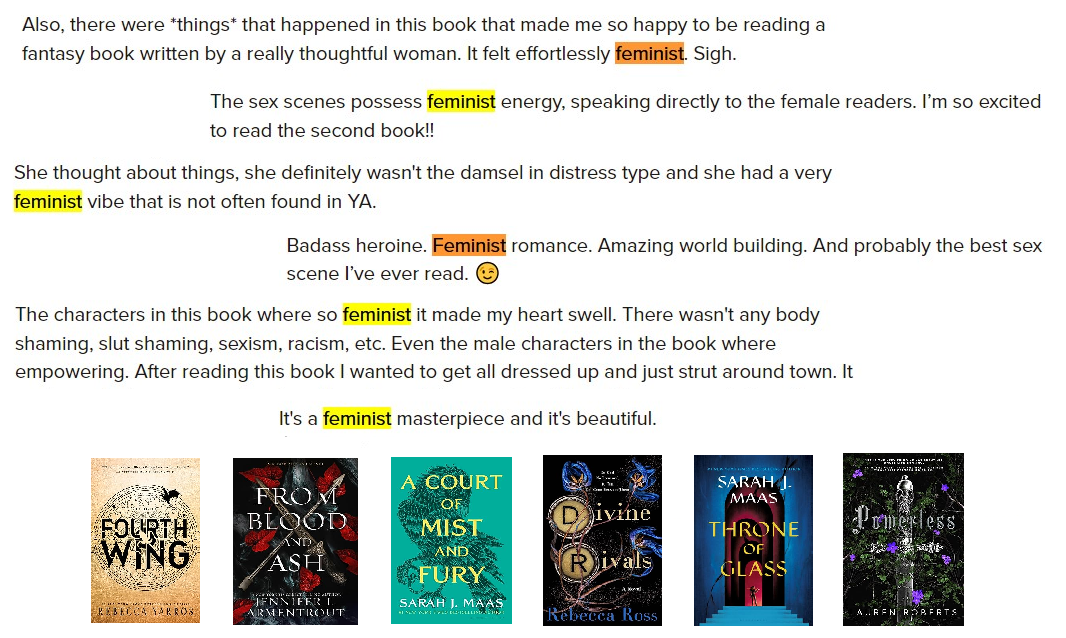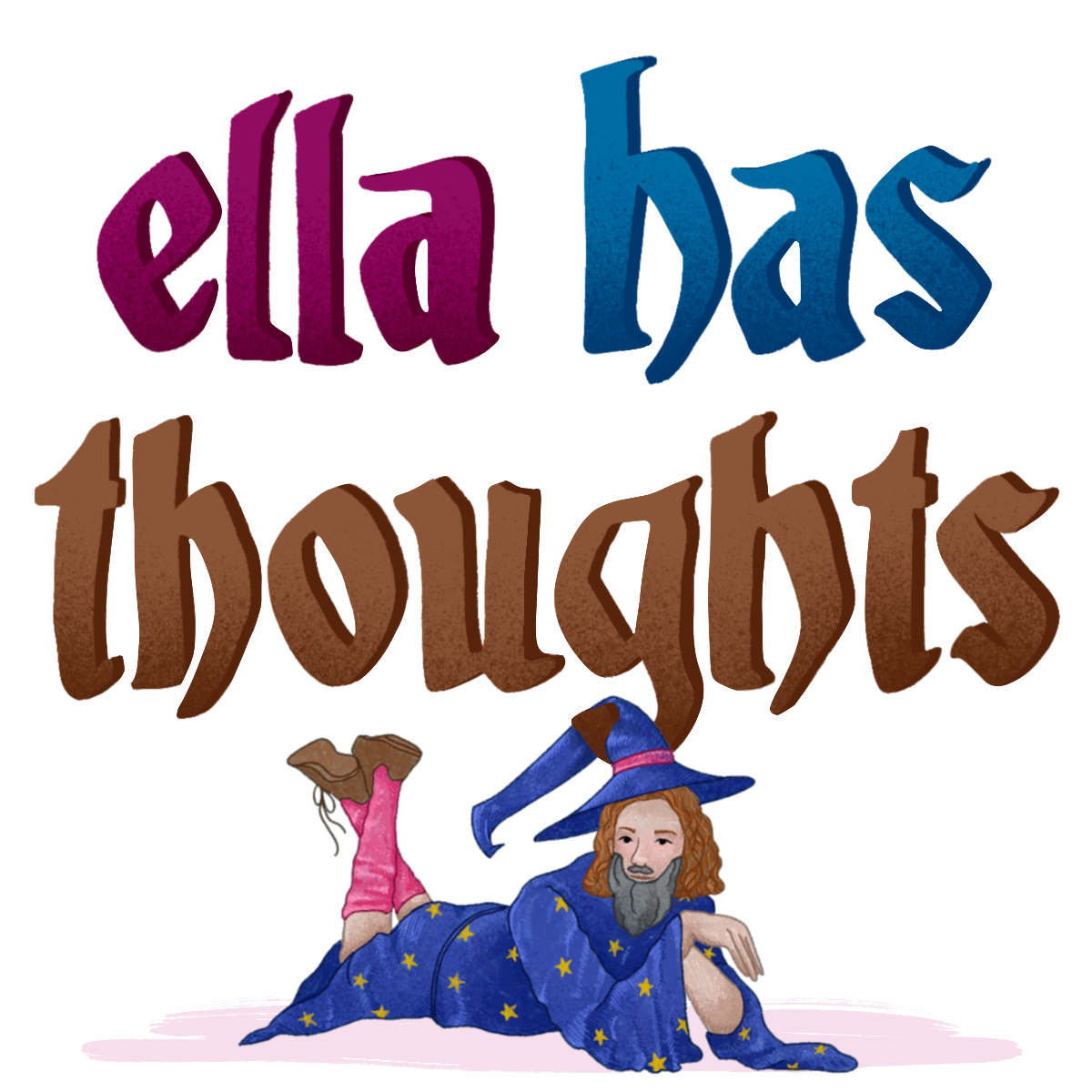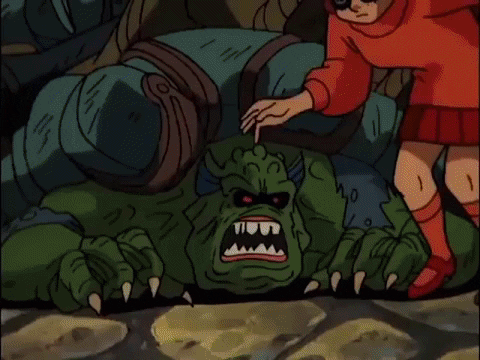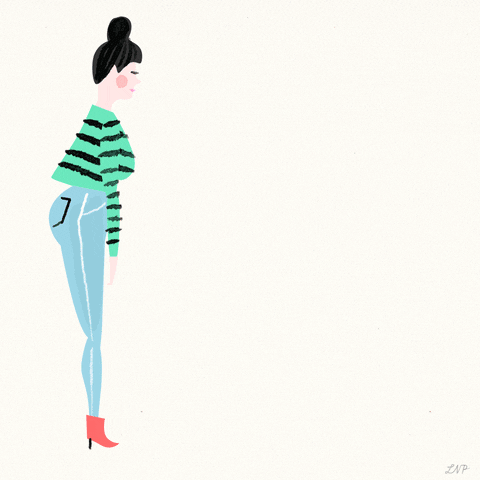Romantasy: Feminist, Or Patriarchy 2.0 Electric Boogaloo?
Are our favourite Romantasy novels feminist, or is it an old man in a mask?
Hello friends! This week I have been having a lot of thoughts™ about this question: Is romantasy as feminist as it seems? It’s a question that has often been raised for me after doomscrolling Booktok, reading a new book, or having discussions with my book clubs, and so I thought it was about time I really sat down and riddled out my thoughts and feelings.
This exploratory piece is not about labelling romantasy, or even specific books, as feminist or not feminist. It isn't an attempt to question the validity of the genre or to dismiss it as lacking literary or personal value. Romantasy, the crossover genre of fantasy and romance, is one of my favourite genres. I also think that the very act of thinking critically about a piece, to give it deeper thought and discussion, is one way to validate it. Here, I want to celebrate the genre and its elements while also looking the way it is sometimes called ‘feminist’ despite often (insidiously) privileging patriarchy and male power.
Note: This piece largely talks about heterosexual relationships as the central romance to these stories, as well as the concept of a “strong female character”. As such, I will be using a lot of male and female pronouns throughout, while also highlighting that feminism is intersectional.
Let’s get into it!
“This book is so feminist.”
Being an active lurker in the Booktok (reader) community as well as GoodReads reviews, I often come across comments and content proclaiming that romantasy (the genre), their favourite romantasy novel, or their favourite romantasy character, is feminist. This idea reminds me of the old “romance is a feminist genre” sentiment which I disagree with, because it pushes the untrue narrative that the genre is in itself feminist and therefore actively working to take down patriarchy (acknowledging that yes, writing romance was once and can be a feminist act). So, it’s no surprise that simliar sentiments being applied to the entire subgenre of Romantasy has me asking a lot of questions.
It’s not just fans of books who are saying it, either. Entangled Publishing’s Red Tower imprint goes so far as to say they are actively seeking to ‘champion feminist and empowered perspectives in the fantasy and science fiction space’ (Publisher’s Lunch, 2022), positioning themselves as distributors of feminist stories.
The question is: Are these stories and perspectives actually feminist?
Yes, both romance and romantasy novels are primarily written by women, for women. I think it is fair to say that some books, in any genre, are feminist, but I don’t think we can accurately and rightly label an entire genre feminist. I’m not setting out to draw any hard and fast lines as to what books we can label what, but I do want to suggest that we be a little more mindful of what we’re labelling and promoting as “feminist”, because language matters.

When it comes to romantasy specifically, I most often see this label being applied to those books which feature a particular kind of “strong” and “powerful” female protagonist. See: woman with a sword, knives, a bow, someone who is capable and willing to inflict violence when the [questionable] need arises. Some of the most popular romantasy books which fit this bill are ACOTAR by Sara J Maas, Fourth Wing by Rebecca Yarros, and From Blood and Ash by Jennifer L Armentrout. I also see these female protagonists called “girlbosses” as a compliment, rather than as the anti-feminist capitalist cooption of feminism that it is. Of course, there’s always going to be someone making a “the feminism left my body when I read this” joke, so there are, as always, contradicting opinions.
Less often do I see the same said of romantasy featuring quiet and more gentle female characters with complex interiority, which is such a shame, and I think deserves more unpacking.
But today, I’m making the argument that some romantasy books that feature these “strong female characters” are perhaps not as feminist as we might think, because they often paradoxically encourage traditional gender roles and create models of femininity and empowerment that don’t interrogate the patriarchal structures they’re born from and operate within. Which means…
They’re not actually challenging patriarchy, they’re winning at it.
What does ‘Feminist’ mean in terms of literature?
Generally, "Feminist Literature" is defined as literature (in whichever form, be it fiction, nonfiction, poetry, etc.) that supports feminist goals, which include establishing and defending equal rights for women. Feminist literature often identifies ways in which women are unequal under patriarchal systems, and shows us the consequences of that inequality, thereby challenging the system and calling for change either implicitly or explicitly.
Operating with the understanding that media is not divorceable from its social, political, and cultural contexts, that feminism is inclusive of all, and that we are still living in a world governed by patriarchy, this means that I am not talking about Choice Feminism, which “offers a worldview that does not challenge the status quo, that promises to include all women regardless of their choices, and that abstains from judgment altogether” and which believes that we are already living in a liberated, post-feminist world that allows all women the freedom of making whatever choices they want (Choice Feminism and the Fear of Politics, 2010).
I think it stands to reason that if we’re going to discuss whether a book is feminist, we need to think about it through the principles and ideology of feminism. Thus, if a novel does not meet the basic definition of feminism (and by extension feminist literature) by supporting the goals of feminism, then it’s not feminist. Unfortunately, as I read more and more, I find myself increasingly disappointed or surprised that a book is being labelled as such.
Oftentimes I can see why people are making the claim, and I can see why we enjoy these books so much and might feel empowered by them. However, in this day and age, I’m just not sure it’s enough to subvert traditional gender roles by having the woman be a violent knife-wielder; I am not sure it’s enough to have the female main character be sassy and mean; I’m not sure it’s enough to have a woman openly feeling sexual desire and engaging in sex on page, even if that is actively challenging prevailing ideas about female sexuality—not if the overall execution and messaging of the book undermines or contradicts feminist values and goals.
In these cases, feminism can feel more like a veneer. I have challenged the notion of romantasy novels as feminist by saying that sometimes they’re not challenging patriarchy, but rather winning it—that is, thriving within the system that seeks the continued oppression of women. When I read novels that give me a pretty picture of feminist ideals (read: strong female character, sassy female character, heroic female character) I am simultaneously captivated and critical, because many of these alleged ‘feminist’ stories in actuality uphold patriarchal values (read: a proclivity for aggression and violence, domination over others, traditionally masculine ideas of heroism).
Men, Masculinity, and Gender Roles
Another side to this that I find myself thinking about often is how many of these books empower women at the cost of male vulnerability and gentleness, and by situating the woman’s traits in comparison with the nearest patriarchal figure. The woman’s strength is comparable to the male main lead’s strength because he is often positioned as either stronger than her or stronger than most. He is the most powerful High Lord, the most ruthless Wing Leader, the Strongest Warrior, and she by proxy is powerful, ruthless, and strong too. The male figure is often unable to be emotionally vulnerable, is either stoic or keeps up a stoic façade that is only broken when the romance blooms to fruition—otherwise, with his male friends, there is no vulnerability. In these cases, men are written to follow patriarchal social scripts too, as heroes who don’t cry, who can withstand insurmountable pain, and who often value traits of toxic masculinity (which the female protagonist often finds sexy, too).
When I encounter a stoic male hero who doesn’t emote, or who only emotes with his female romantic partner in private, it brings to mind something Bell Hooks wrote: “Since shaming is often used to socialize boys away from their feeling selves toward the patriarchal male mask, many grown men have an internal shaming voice.” (The Will To Change, 2004). Often, it feels like these characters are furthering the ‘harmful stereotype of masculinity’ (Lyons, 2018) that men aren’t capable of the same emotions as women, or are more capable of working through and hiding their emotions to remain level-headed. If we’re constantly writing romance narratives that paint masculine heroes as invulnerable, stoic figures, what is the implicit message?
If a novel is perpetuating harmful stereotypes and ideas of masculinity, continuing to relegate men and women to traditional gender roles, I don’t think we can call it feminist. Empowering female characters by making them measure up to men through the same unhealthy standards patriarchy holds them to, does not help dismantle patriarchy or even call it into question. Feminism calls for social, political, economic, and civil rights for all genders, which also means we must recognise the ways in which men and boys have been and continue to be victimised by patriarchy, too.
What about sex? Romance and romantasy books are making strides in the world of consent from women, putting emphasis on its importance and being careful to establish it now more clearly than ever. Female characters in mainstream popular romantasy openly desire and have sex, too, which can be read as challenging society’s normative pressure for women to keep that private. Some of these female characters find liberation in their sexuality, leading to narratives of female empowerment through sexual autonomy and sex positivity. That being said, how often do we see men’s consent being established with the same care? In drawing attention to women’s empowerment through sexual choice and activity, there is often still perpetuation of the prevailing belief that men are always ready for and wanting sex, that they are ruled by primal desires.
The Possibilities of Fantasy; The Question of Genre
The fantasy genre offers possibilities for the subversion of social and cultural norms, giving them a place and vessel through which we can challenge them. It gives us ‘the illusion of the suspense of the social rules of the society in which they live’ and thus this world ‘is one in which literally anything could happen’ (Jude Roberts and Esther MacCallum-Stewart, 2016). In fantasy, we can do anything and have any kind of world. Oftentimes, I see people telling reviewers who are critical of fantasy novels which feel ‘problematic’ that we shouldn’t judge books by real-world standards and ideologies, but I don’t know how we can do that when they are so often replicated in the fantasy we read.
In her study ‘Fantasy: The Literature of Subversion’, Rosemary Jackson states that fantasy can only be understood in relation to the dominant ideology of a given time. This means we cannot wholly divorce them, even when we acknowledge that they are different. The same goes for our current discussion: in order to call a novel feminist, by definition we must measure it up to our real-world dominant ideologies.
So, I have a lot of questions, especially when it comes to fantasy romance novels which base themselves on more egalitarian social structures. If these narratives are truly feminist, why is the fantasy still so limited to one which ultimately reinforces the very systems feminism is fighting against, without acknowledgment in-text or by readers who label it feminist?
When I think about romance and feminism, I think that as readers we are primed and being asked to root for the romance to come to fruition. That is the point of the genre, after all, to watch the main leads fall in love. Add feminism into the mix, and you have me sold. Except for when these narratives justify ‘women’s submissiveness as romance’ (Borgia, 2014). I mentioned ‘genitals over gender equality’, and it stems from a common thread in some of the most popular romantasy novels of our ‘strong female character’ noting, in passing, that something is sexist or problematic, but quickly forgetting and ignoring it for the way her body reacts when thinking about or in proximity to the male love interest—this alleged ‘sexual empowerment’ turning them into ‘perpetual victims of… desires’ that dismiss feminist critiques as unimportant, silly, or too small to give more thought, especially when and explicitly because he’s just so hot. In this narrative, feminism is nothing but a hindrance, a small hurdle to sex and the ensuing romantic relationship.
But I feel empowered!
Romantasy absolutely can and does have feminist themes and elements. It can absolutely feel empowering and inspiring, and be a source of comfort and fun. As I mentioned earlier, I don’t want to sound like I’m gatekeeping a social movement or theory, I really just want us to be a little more careful of how and what we’re labelling as “feminist”, what we’re giving the stamp of approval or qualification that tells readers, young girls and women especially, that this is what feminism is.
I think deciding whether to call a book feminist needs to take into account more than just how it made me as an individual feel; The things we consume are not separate from their political, social, and cultural contexts, and I am but an individual in community with others.
Is the book making the lead woman ‘girlboss’ their way out of the oppressive systems as an individual, not helping others climb the ladder with them, or not cutting the ladder down and equalling the playing field for everyone?
Is there any intersectionality in the book, or is everyone white and or straight and or able-bodied? Are the characters free to explore their power and sexuality and desires, but only within the established hierarchy that relegates them to subordination and offers them limited opportunities and resources to reject it? If a character’s empowerment depends on restrictive emotionality, avoiding or decrying femininity seeking achievement and status, encouraging individualism, aggression, a willingness to inflict violence, things which patriarchy values (Becker, 1999)… is it feminist, or is it playing the game of Patriarchy and winning a trophy? What is ‘strength’ and how do we measure it?
Romantasy is, in a sense, paradoxical to me. They are often both freed from our real-world cultural and social norms, yet still shackled by them; The women have special qualities and powers that help them become heroes, yet that heroism is often that of traditional masculinity; The strong female character challenges patriarchy, yet this "challenging" really only serves to reinforce the status quo and have her "succeed" within it; These romances sometimes centre the idea of sexual liberation, while also depicting dubious or non-consensual acts as desirable and romantic; These women are desired and openly desire others, yet their romances have them adhere to and choose patriarchal power structures through rendering her so aroused that she’s unable or unwilling to meaningfully question them.
Now we circle back around to choices—and choice sounds really good in theory, doesn’t it? Our strong female protagonist has or wins the agency and freedom to make her own choices, therefore the book must be feminist, right? Within Choice Feminism, it is 'definitionally impossible' for her to 'choose her own oppression' because all choices she makes are seen as 'expressions of her freedom' and liberation, and therefore shouldn’t be judged, only supported (Choice Feminism and the Fear of Politics, 2010).
Whether you think this is feminist is up to you and how you understand and define it. To me, being feminist means viewing things in their full context (or as close to their full context as we can), being inclusive and intersectional, and banding together against the systems that oppress us. Being feminist requires political consciousness and for us to understand that what feels empowering and libratory for us may not be empowering and libratory for others.
This also means that some of our favourite heroines and books may not technically be feminist, as much as we may feel inspired and empowered by them.
That's all from me this week. I’d love to know what you think! 💝
Sources:
Becker, Mary. (1999). Patriarchy and Inequality: Towards a Substantive Feminism. University of Chicago Legal Foru, Issue 1.
Borgia, D. (2014). ‘Twilight: the glamorization of abuse, codependency, and white privilege’, The Journal of Popular Culture, vol. 47.
Ferguson, M. L. (2010). Choice Feminism and the Fear of Politics. Perspectives on Politics, 8(1), 247–253. http://www.jstor.org/stable/25698532
Hooks, Bell. (2004). The Will to Change: Men, Masculinity, and Love. Washington Square Press.
Jackson, R. (1981). Fantasy: the Literature of Subversion, Methuen, London.
Lyons, A. (2018). RACGP - The “stoic” stereotype and its impact on men’s mental health. Racgp.org.au.
Roberts, J and MacCallum-Stewart, E. (2016). ‘Introduction’, Gender and Sexuality in Contemporary Popular Fantasy: Beyond Boy Wizards and Kick-Ass Chicks, Eds. J Roberts and E MacCallum-Stewart, Routledge, London.
The GIF used for the face of this piece is by INTO ACTION on Giphy



